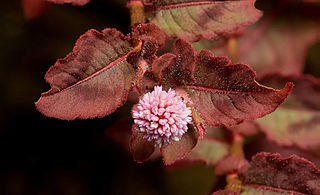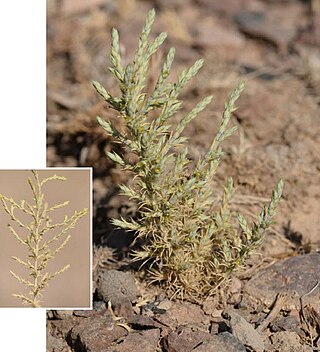
Persicaria is a genus of herbaceous flowering plants in the knotweed family, Polygonaceae. Plants of the genus are known commonly as knotweeds or smartweeds. It has a cosmopolitan distribution, with species occurring nearly worldwide. The genus was segregated from Polygonum.

Celtis is a genus of about 60–70 species of deciduous trees, commonly known as hackberries or nettle trees, in the hemp family Cannabaceae. It has a cosmopolitan distribution.

The genus Pulsatilla contains about 40 species of herbaceous perennial plants native to meadows and prairies of North America, Europe, and Asia. Derived from the Hebrew word for Passover, "pasakh", the common name pasque flower refers to the Easter (Passover) flowering period, in the spring. Common names include pasque flower, wind flower, prairie crocus, Easter flower, and meadow anemone. Several species are valued ornamentals because of their finely-dissected leaves, solitary bell-shaped flowers, and plumed seed heads. The showy part of the flower consists of sepals, not petals.

Stellaria is a genus of about 190 species of flowering plants in the family Caryophyllaceae, with a cosmopolitan distribution. Common names include starwort, stitchwort and chickweed.

Alexander Georg von Bunge was a Russian botanist. He is best remembered for scientific expeditions into Asia and especially Siberia.

Pinus gerardiana, commonly known as the chilghoza pine or neja, is a pine species native to parts of central and southern Asia, including the western Himalayas. The International Union for Conservation of Nature (IUCN) listed it as near threatened in 2011. The pine nuts are locally collected for consumption.

Pinus bungeana, also known by the common names Bunge's pine, lacebark pine and white-barked pine, is a pine tree native to northeastern and central China. It is a slow-growing tree that can grow to heights of 15–25 metres (49–82 ft) is frost hardy down to below −26 °C (−15 °F). Its smooth, grey-green bark gradually sheds in round scales to reveal patches of pale yellow, which turn olive-brown, red and purple on exposure to light.

Isatis is a genus of flowering plants in the family Brassicaceae, native to the Mediterranean region east to central Asia. Its genus name, Isatis, derives from the ancient Greek word for the plant, ἰσάτις. The genus includes woad. Due to their extremely variable morphology, the Asian species in particular are difficult to determine; the only reliable diagnostic feature is the ripe fruit. They are (usually) biennial or perennial herbaceous plants, often bluish and hairless or downy hairy with the upright stem branched.

The Morris Arboretum & Gardens of the University of Pennsylvania is the official arboretum of the Commonwealth of Pennsylvania. The Arboretum is open daily except for major holidays. It is located at 100 East Northwestern Avenue, Chestnut Hill, Philadelphia, Pennsylvania.
Lacebark is a common name for several plants, lacebark trees and may refer to:

The Botanische Gärten der Friedrich-Wilhelms-Universität Bonn, also known as the Botanischer Garten Bonn, is a botanical garden and arboretum maintained by the University of Bonn. It is located at Meckenheimer Allee 171, Bonn, North Rhine-Westphalia, Germany, and open except Saturdays in the warmer months; admission is free.
Coleophora apta is a moth of the family Coleophoridae.

Celtis bungeana, commonly known as Bunge's hackberry is a deciduous tree in the genus Celtis that can grow 15 meters in height.
Lacebark tree is a common name for several plants with a inner lace-like layer of the inner bark, and may refer to:
Plants of the World Online (POWO) is an online database published by the Royal Botanic Gardens, Kew.
Persicaria bungeana is a herbaceous annual, flowering plant species in the family Polygonaceae. Commonly known as prickly smartweed or Bunge's smartweed, it is a weed found in soybean fields of the Mid-Western United States of America.

Girgensohnia is a small genus of plants in the family Amaranthaceae. They range from the eastern Mediterranean to the Caucasus, central Asia, Pakistan, and Xinjiang.
Fraxinus bungeana is a species of flowering plant belonging to the family Oleaceae.
Pulsatilla bungeana is a species of flowering plant belonging to the family Ranunculaceae.
Gustav Karl Girgensohn (1786-1872) was an Estonian botanist (bryologist); court counselor in Tartu. He edited the exsiccata Musci frondosi et Hepaticae exsiccatae. Laub- und Lebermoose der russischen Ostsee-Provinzen in getrockneten Exemplaren (1849-1856).











